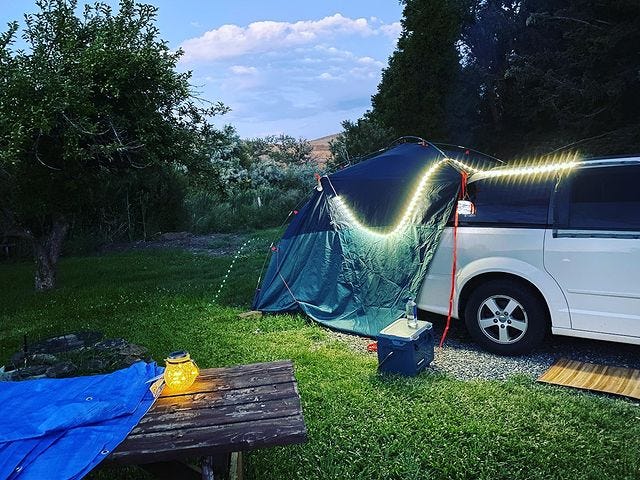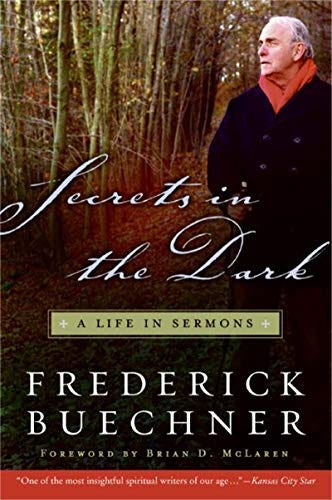Back to School & Remembering Frederick Buechner
What I did and didn’t do this summer
I don’t know if it’s that I’ve been married to a teacher for 32 (!?) years and therefore tied into the rhythms of the school year, or it’s my hatred of hot weather or my desperate need for routines, but by the end of summer I always feel like I’m just killing time until Labor Day weekend, after which life can finally get back to normal.
Yes, I enjoy the first fruits of the sunny freedoms of June, but it doesn’t take long before freedom turns to chaos—mostly inside my head but also in actuality. I’m very affected by my husband’s lack of routine during the summer months. I try not to be. I have my own home office and it really shouldn’t matter whether he’s here or not, whether he leaves for his bike ride when he says he’s going to, whether he’s sitting at the table in his pj’s when I walk by, whether he’s doing a kitchen project or reading a book. It should not matter!
But alone in my office and alone in the house are not the same thing, and living completely alone for most of September 2021-May 2022 got me especially used to the latter, in ways I liked and ways I didn’t. This summer has been an adjustment back to full-time cohabitation.
At any rate, I’m glad that the shapeless days of summer are coming to an end. However—as is usual for me—the thought of fall has me being overly ambitious about what I want to get done between Labor Day and Thanksgiving, and I keep writing unhelpful things on my to-do list, like, “change my life” and “get rid of all my stuff” and “figure out the future.” I’ll let you know how that goes.
What have I been doing in these summer months? Spending time offline, hanging out with my husband, and attending two MFA residencies. One was virtual, to meet new Lesley U students. The other was in Seattle to say goodbye to my SPU graduates. I drove to Seattle from SLC, a thing I’ve never done before, and it was great to get the van on the road.
There I am somewhere near Pondosa, Oregon, living the #minivanlife dream. I’d planned to camp again on the way home, but I just wanted to get home already and also there was an extreme heat warning where I was, and the thought of all the setup and breakdown of camp did not thrill me.
So I stayed in a little motel in Baker City, Oregon, and dined with the locals. There’s something so appealing to me about Northwestern small town life in these places that may look like the middle of nowhere but have interesting histories and some beautiful landscapes. Too bad about the economic depression and racism!
Through the summer, I haven’t written much of anything. That soon must change. And with the return to fall routines, it will!
The loss of a mentor (who can’t really be lost)
Writer Frederick Buechner was one of my mentors. Not the kind of mentor you meet and talk to, but the kind whose work has a more distant but profound influence on your life. He died on August 15th. Buechner was a novelist and a minister, who wrote about faith with the style and depth of a novelist, and who understood the shadow side of life and faith, writing and depression, missing fathers and the search for self.
To be honest, I didn’t realize he was still alive. I’d written to him years ago when I heard he wasn’t doing well, to make sure I could say a general thank you before he passed. He generously wrote back a one-sentence letter in a trembly hand, and I assumed then he had one or two years left in him. So the news of his death didn’t hit the way it might have had I not taken that chance to write to him.
Of course, when people leave behind a body of work that is still speaking to you, they can’t truly be taken by death, even if death really is the end—though the faith he and I share suspects that it is not. He’s been a spiritual mentor, a writing mentor, and a paternal figure in my psyche for a long time. Whatever else death means, that won’t change.
Michael Gerson wrote a reflection here, and this line from it distills the spirit behind Buechner’s work:
More than anyone else in recent literary history, he showed how a modern person, schooled in skepticism, pursued by appropriate doubts, could find the frequency of grace, as if he were tuning an old radio.
I think it’s clear in his memoir writing that he fought to find that frequency. I don’t think the station always tuned in. I think he deeply understood what it was to search the airwaves and get only static. But he listened hard to his life and the world in hopes of finding and re-finding the frequency. In his book Now and Then: A Memoir of Vocation, he wrote:
[I]f I were called upon to state in a few words the essence of everything I was trying to say both as a novelist and as a preacher, it would be something like this: Listen to your life. See it for the fathomless mystery that it is. In the boredom and pain of it no less than in the excitement and gladness: touch, taste, smell your way to the holy and hidden heart of it because in the last analysis all moments are key moments, and life itself is grace.
This is at the core of why I’m still loyal to realism as a writer, why I care about everyday life in my books and the meaning that can be found if we look and listen. He articulated that better than anyone, and his words still hold me accountable.
Want shorter, more frequent updates about writing and the writing life? Subscribe to the This Creative Life newsletter.
Want to know more about Frederick Buechner? The Frederick Buechner Center is a good place to start.
Want to buy my latest books? Browse here.




